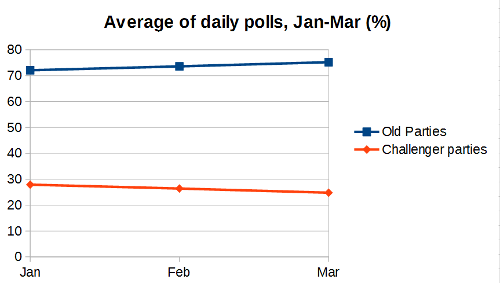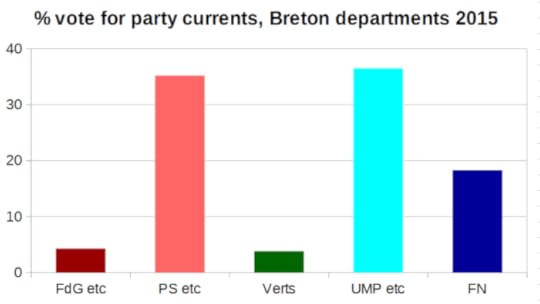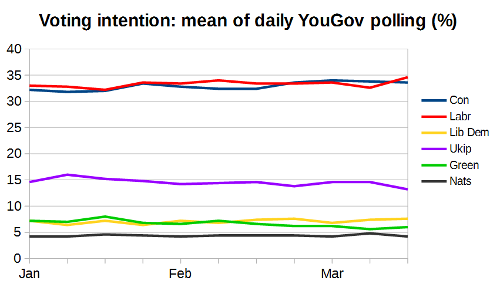Bernard Deacon's Blog, page 68
April 5, 2015
The week’s polling: Tories ahead while the big squeeze tightens
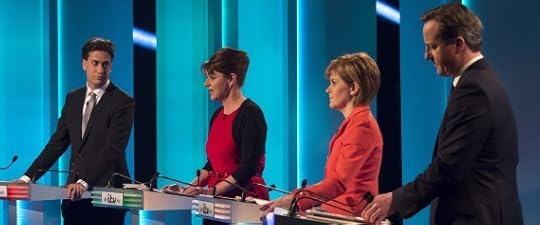 Spot the UK’s next Prime Minister
Spot the UK’s next Prime MinisterThe first week of campaigning since the official start of the election campaign may have gone to Miliband but it’s the Tories who are creeping ahead in the polls. In fact, this past week saw rather bigger moves in the YouGov daily polling than we’ve seen so far this year. The Tories gained over a percentage point in a week and the Greens lost a similar amount. It may be that people are beginning to focus as we enter the final five weeks of the campaign. And as the party leaders hog the media focusing means running back yet again to the apron strings of the old parties.
w/e April 3
w/e March 27
change
Conservatives
35.4%
34.2%
+1.2%
Labour
34.6%
34.8%
-0.2%
Lib Dems
8.0%
7.8%
+0.2%
Ukip
12.4%
12.4%
nc
Greens
4.6%
5.8%
-1.2%
SNP/PC
4.6%
4.4%
+0.2%
The pattern of the past week repeats, but emphasises, that of the past month. The Tories are three points up on their February ratings, Labour and the Lib Dems about a point up, Ukip and the Greens a couple of points down. The conclusion is plain – the squeeze is well and truly on as the old parties take advantage of a ludicrous first past the post voting system to persuade people to vote for what they least like rather than prefer.
The question now is can the challenger parties – Ukip, the Greens and everyone else – halt the slide? The answer is yes. And no. In 1997 challenger parties saw their share of the poll rise from 6% to 8% in the five weeks of the election campaign. On the other hand, in 2010 their share fell from 11% to 9%. But in 1997, five weeks from the poll Labour held a huge 20 point lead over the Tories; in 2010 it was much closer. If one party is well in the lead voters may be more prepared to vote for their first preference; if things seem tight they’re more vulnerable to pressure to waste their vote by voting ‘tactically’.
Unfortunately for Ukip and the Greens, 2015 looks much more like 2010 than 1997. In fact, it’s even closer than 2010. Moreover, in 1997 the challengers included James Goldsmith’s Referendum Party, which spent as much as the Tories and Labour. This time even Ukip will be well outspent by the old parties who can rely on assorted millionaires, hedge funds and trade unions to bail them out.
But there are two caveats.
First, vote share can fall overall yet seats can still be won. In 2010 the Greens scored an average 1.8% in the seats they contested, down from 3.3% in 2005. Yet they gained a seat. Targeting resources on winnable seats can overcome the squeeze.
Second, it’s usual for around a quarter of voters to change their minds in the final month of an election campaign. By this time next week we’ll know exactly who’s standing (nominations close on Thursday) and the media air-war will be well and truly joined by the war on the ground. Efforts there can still make a difference and numbers and energy outweigh money. Who knows, voters may realise that the old parties cannot be trusted to do anything about global warming or growing inequalities. Just joking!
If the trends of the past month continue we’re looking at a general election result something like this in terms of vote share. How this will translate into seats is anyone’s guess.
Predicted share of vote May 7th
Vote share
Change since 2010
Conservatives
37%
+1%
Labour
36%
+7%
Lib Dems
8%
-15%
Ukip
11%
+8%
Greens
3%
+2%
Others
6%
-2%
Challenger parties will still make gains on 2010 and the long-term disintegration of support for the Con/Lab/Lib neo-liberal centr(al)ist consensus will continue. Moreover in Scotland this week saw the SNP restore its 15% lead over Labour, something reinforced by Nicola Sturgeon’s comprehensive trouncing of the middle aged, middle class men in this week’s TV ‘debate’. In Scotland it looks like last week’s smaller poll gap was a blip, not a trend.
PS: While we’re on trends note that, while YouGov only seems to have noticed the end of the ‘Green surge’ on April 2nd, you read about it here first – over a month ago in fact.

April 3, 2015
The good, the bad, the ugly, and the school prefects: the election in east Cornwall
How is election fever playing in the bandit country up by the Tamar? In North Cornwall Dan Rogerson is buoyed up by the latest constituency poll, which shows him pulling ahead. He defiantly asserts that ‘more and more people are lending their support’ by intending to vote for him rather than their first, second or third choices in order to stop the Tory postman, Scott Mann. Scott in the meantime concentrates on delivering the news from a Tory Manichean world of moral dualism. Here, it’s just a question of strong leadership or weak, competence or chaos, good or evil, pasties or pies.
 Dressed just right for litter picking
Dressed just right for litter pickingMeanwhile, Dan has been banishing the evil curse of litter from our roadsides. After recovering litter from the A30 at Pennygillam he pronounced the roadside to be ‘looking beautiful’. Until the next lazy sod chucks their Macdonalds packaging out of their window that is. In the account of his litter picking he’s described as ‘rolling up his sleeves’, something he’s patently not doing in the accompanying photo. Indeed, he seems rather inappropriately dressed for the task in hand. Even stranger, he was ‘later'(?) spotted cleaning up Westminster, this time wearing a hi-vis jacket. On the same day!? Must have used that Lib Dem time machine to get back up to London. That’s the same machine that’s set permanently to April 2010 and miraculously jumps over the last five years in a nanosecond.
Ukip’s Julie Lingard was giving us lots of pictures of Nigel Farage, who she oddly predicts ‘will occupy the centre ground of British politics’. It turns out this was a quote for those sophisticated political analysts at the Daily Express, for whom Ghengis Khan would be on the centre-left. Otherwise Julie thinks the ‘farce’ of green energy and the bedroom tax are bad but local planning referenda good and wants to scrap inheritance tax (definitely bad). In contrast, the Greens’ Amanda Pennington reminds us that we have a choice, although it’s not one on offer from the three old parties or Ukip. We might possibly raise taxes instead of cutting services. She points out that a 2% wealth tax could raise £35bn a year by 2020 and a Robin Hood tax on financial transactions another £25bn a year. That’s the deficit sorted then. Just global warming left.
Finally, Labour’s John Whitby reveals a fine sense of humour as he contemplates his hopeless task in the north. He supplies a picture of himself in his kitchen; why should Cameron and Milibland hog the headlines? And tells he’s going to vote for himself. That’s one in the bag then, although it’s going to get a lot tougher from here on.
On the southern side of Bodmin Moor the sitting Tory MP Sheryll Murray exudes confidence. She modestly states in a Facebook post that ‘I hope to be Conservative MP after May 7th’. This attracted 126 likes in a couple of days from people who enjoy reading about the armed forces and the police and experience a quiver of excitement at the name-dropping of local organisations. Will they be so jolly happy though when they get another set of unregulated cold-calling spivs pestering them by phone to get their mitts on their pension pots? This is the inevitable result of the failure of Sheryll’s mates to regulate cold-calling at the same time as freeing access to pension pots. Another fine mess.
Liberal Democrat Phil Hutty hasn’t been ringing but speaking to thousands of people from St Neot to Saltash, all of whom assure him they’re dead keen to rush to the polling booth to cast their vote for him. He also took time to appear on the Sunday Politics Show. Unfortunately no reports of what was discussed are available as everyone watching fell asleep halfway through. Phil’s Facebook page is ruined entirely by a photo of assorted dimwits holding up those excruciating Lib Dem ‘Winning here’ posters. It’s surely high time these were corrected to a more accurate ‘Coming a distant second here, if we’re lucky that is.’
MK’s Andrew Long and the Green Party’s Martin Corney press on with their local campaigning. Andrew was talking at MK’s spring conference about the importance of embracing social media. Strangely however, he’s not that active on twitter and has no detectable Facebook presence. Maybe there’s a parallel universe of MK social media somewhere. Martin has been focusing on trivialities like climate change and keeping fossil fuels in the ground in order to save us from the corporate plan to fry us in order to enhance their profit margins.
Ukip’s Bradley Monk has no truck with such silliness. Young Fogey Brad prefers tax cuts for the wealthy, even more deregulation of business and encouraging the entrepreneurship that’s produced out of control global warming in the first place. He’s also prepared to take a brave, or is it foolish, public stance in favour of privatising the delivery of NHS services – ‘often private companies are able to offer a higher quality service, and for that we should be grateful’. Brad also seems unaware he’s contesting a seat in Cornwall rather than England.
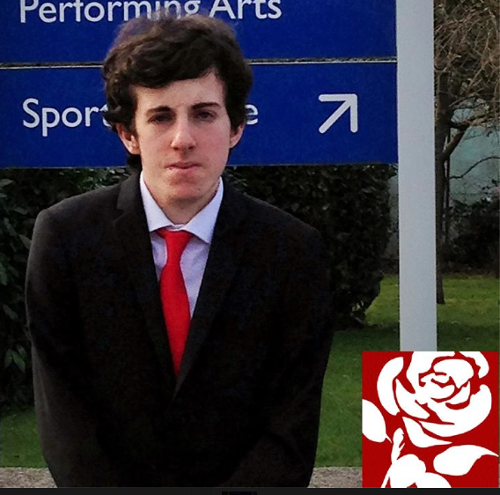 Cornwall’s youngest candidate
Cornwall’s youngest candidateBrad’s locked in a parallel election in this seat for school prefect with Labour’s Declan Lloyd. Declan is even younger than Brad and in fact, at 18 years and 8 months, the third youngest candidate in the UK. At the moment the smart money is still on Brad to pip Declan for the school prefect post but it might turn out to be closer than it once looked.

April 2, 2015
Constituency polling: Coalition still set to win all Cornish seats
Ashcroft’s polling organisation yesterday published poll details from eight constituencies described as Tory-Lib Dem marginals. While the joyous prospect of Clegg losing his Sheffield seat has not surprisingly grabbed the headlines, four of Ashcroft’s polls were taken in Cornwall. This gives us a unique snapshot of the intentions of voters in Cornwall as of last week.
Here are the headline shares of the poll, with the change since the last Ashcroft polling done back in June (Camborne-Redruth) and August (the other three seats). Truro is now deemed to be safe for Sarah while everyone is assuming the Tories have South East Cornwall stitched up.
Constituency voting intentions, March 2015, Ashcroft polling
North Cornwall
St Austell & Newquay
Camborne & Redruth
St Ives
Con
36% (+4%)
32% (+5%)
37% (+8%)
33% (+2%)
Lib Dem
38% (+5%)
26% (nc)
13% (-1%)
36% (+4%)
Labour
6% (-4%)
10% (-3%)
24% (nc)
10% (-1%)
Ukip
13% (-7%)
20% (-5%)
14% (-12%)
11% (-7%)
Green
6% (+3%)
6% (nc)
8% (+3%)
7% (+1%)
Others
1% (nc)
4% (+1%)
3% (+1%)
3% (+1%)
Since last summer there’s been a swing back to the old familiar territory of Conservatives and Liberal Democrats. The bar chart shows the average change in the four seats.
The Tories are up across the board. It’s a somewhat more mixed picture for the Lib Dems. Their vote has risen in St Ives and North Cornwall, but in Camborne-Redruth it’s fallen slightly (through within the margin of error) and in St Austell it’s stagnating. It seems that while Andrew George can hold on to a personal vote and Dan Rogerson rely on North Cornwall’s Liberal voting tradition to fend off the Tories, in St Austell Tory Tory Steve Double is doing a lot better than Lib Dem Tory Stephen Gilbert.
It’s bad news for Ukip as across all four constituencies their support of last year is fast crumbling away. From being the main challenger to the Tories’ George Eustice in Camborne, they’ve slipped to also rans and only in St Austell does there remain a sniff of a possible upset.
Labour are also suffering from the squeeze. Even in Camborne-Redruth, where their candidate has thrown a truckload of cash at the seat, they remain well behind Eustice, although now positioned to be the main recipient of any anti-Tory tactical voting here.
As a protest vote for Ukip becomes increasingly pointless, voters might as well cast around for other more radical options. On paper the Greens look to be doing well, pushing up their vote since last summer. However, as the ‘Green surge’ peaked in mid-January and then turned into a Green slide, it’s likely that something similar has happened in Cornwall and been missed by these polls. They must be disappointed that there’s no evidence at all of any Green surge in St Ives, one of their ten target seats. In fact the Greens are somewhat surprisingly doing better in neighbouring Camborne-Redruth. Nonetheless, the party enters the election campaign proper with a solid base to build on and can look forward to saving their deposits.
There’s even some cheer here for MK, ignored and marginalised in the grand carnival of Westminster elections. In all seats except North Cornwall (where they’re presumably not standing) the vote for Others has consistently risen. This is likely to understate potential MK support as polling organisations do not prompt with their name, unlike Ukip and the Greens. Indeed, when voters mention ‘another party’ the secondary prompt includes the BNP. Yet the BNP is not standing and only had one candidate in Cornwall last time around, whereas candidates for ‘the party that must not be named’ have been in place for over a year now.
Overall then, from this it looks like four Tory/Lib Dem coalition MPs and two Lib Dem/Tory coalition MPs in May. No change basically. Although the share of the poll for the coalition parties has slumped from 83% in the 2010 general election to 62-63% now in these four seats, the majority of the great Cornish electorate prove they can be comprehensively fooled yet again. Even now. Exit stage left, muttering.

April 1, 2015
Vlad the Impaler, flip-flops and fair play: the election in mid-Cornwall
It’s still ominously quiet in the two constituencies of Truro & Falmouth and St Austell & Newquay. In Truro, Sarah Newton curiously thought it was a vote-winner to ask Iain Duncan Smith to visit. This took place in that strange ToryWorld where £12 billion more welfare cuts is an example of ‘improving people’s lives’. As a shiver of fear ran through the disabled and vulnerable across the land, Radio Cornwall interviewed Duncan Smith about ‘welfare support’, which is a bit like asking Vlad the Impaler for his views on blood transfusion.
 Sarah and Vlad visit a centre for the jobless
Sarah and Vlad visit a centre for the joblessWhile Sarah was hosting Vlad, Ukip’s John Hyslop was inviting Paul Holmes, leader of Cornwall’s equally long-dead Liberal Party, to address Ukip’s Truro constituency AGM. The Liberals were formerly supporters of a Cornish Assembly but presumably now feel, like their new chums, that it’s all a European plot. Strange times.
The Green Party’s new candidate Karen Westbrook was down at Falmouth joining a demo by University of Falmouth students against cuts in contemporary arts courses. All the protesting students assured Karen they were going to vote for her. So now all she has to do is persuade them to register and then get up before the polls close.
Meanwhile, what about the others, the (five) dwarves to Sarah Newton’s Snow White? They’ve all been too busy doing other stuff (or perhaps some of them are actually out leafleting and canvassing instead of producing an avalanche of old-style paper-pleading) to dent this media image. Simon Rix for the Lib Dems can’t be bothered with Facebook any more. But he still found time to pop up on Spotlight calling for the abolition of Police Commissioners. This couldn’t possibly be the same Police Commissioners our hapless three Cornish Lib Dem MPs all voted to introduce in 2011 could it?
While Simon was frantically flip-flopping in time-honoured Lib Dem tradition, Labour’s Stuart Roden, wearing his UNISON hat, was ‘pragmatically’ supporting the amalgamation of police services with Dorset while drawing the line at privatisation. As yet it’s unclear whether, wearing his Labour hat, he’ll also draw the line at something his party was quite keen on from 1997 to 2010.
MK’s Stephen Richardson was asking for money. Unlike Labour, MK has no millionaires or East End actors to call on; unlike the Tories it has no shady organisations in the Home Counties funnelling hedge fund money their way; unlike the Lib Dems it has no idiots willing to dig into their pockets for a lost cause. Ex-MK candidate Loic Rich, now Independent via a detour among the Tories, was too busy being mayor of Truro while Rik Evans of the National Health Action Party also has a surprisingly subdued online presence, given the steady drip feed of news about a disintegrating NHS.
Moving east to neighbouring St Austell & Newquay, sitting Lib Dem MP Stephen Gilbert was enthusiastically re-tweeting a tweet from a new member. Except that it would have been more convincing evidence for a huge turn to Stephen in order to ditch the dastardly Tories if only Mr Maynard hadn’t been a Lib Dem candidate at the Mevagissey by-election last November. Perhaps he left and then re-joined. Stephen followed this patent act of desperation with a fierce attack on Labour’s record on privatising the NHS.
Except that it would have been more convincing evidence for a huge turn to Stephen in order to ditch the dastardly Tories if only Mr Maynard hadn’t been a Lib Dem candidate at the Mevagissey by-election last November. Perhaps he left and then re-joined. Stephen followed this patent act of desperation with a fierce attack on Labour’s record on privatising the NHS. In case voters in St Austell are forgetful, at this point we have to perform a public service and remind them Stephen Gilbert also voted moderately in favour of the Tories’ ‘reform’ of the NHS. While we’re at it he voted 98.4% of the time with the Tory/Lib Dem governing coalition in the last parliament. (Dan Rogerson in North Cornwall voted with them 97.8% of the time and even Andrew George managed 92.4% support.)
In case voters in St Austell are forgetful, at this point we have to perform a public service and remind them Stephen Gilbert also voted moderately in favour of the Tories’ ‘reform’ of the NHS. While we’re at it he voted 98.4% of the time with the Tory/Lib Dem governing coalition in the last parliament. (Dan Rogerson in North Cornwall voted with them 97.8% of the time and even Andrew George managed 92.4% support.)
Turning from one government loyalist to another, the Tory Tory Steve Double might be forgiven for getting a little over-confident. Confidence oozing from every pore, he told us he was lying in bed (too much information Steve) contemplating his role in the next coalition government and looking forward to being in the Commons for the next Prime Minister’s Questions circus. Those whom the gods wish to destroy etc …
Labour’s Deborah Hopkins continues to churn out Facebook posts as if they were going out of fashion. She kindly informs us of scores of Labour pledges, including building 200,000 houses a year, ‘focusing on’ (?) social housing. That’s Newquay accounted for then so what about a few more for other places? But where’s Labour’s pledge to reduce the deficit by £30 billion? Or Ed Ball’s pledge not to raise any of those nasty taxes, thus condemning us to even more ‘sensible’ cuts?
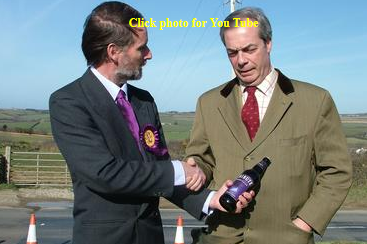 Come on Nige, another Tribute can’t hurt you
Come on Nige, another Tribute can’t hurt youIf Deborah leaves us a little confused on that issue, that’s nothing compared with the confusion we encounter when consulting the website of Ukip’s David Mathews. This can only charitably be described as a complete mess. A quote from William Wallace (of Braveheart, not Bugle), photo of a quizzical Nigel Farage and other stuff jostle for space with ‘100 reasons to vote Ukip’. Be warned though. Anyone intrigued by how there can be 100 reasons when they’re struggling to come up with one will need the patience of Job. In fact, given the average age of Ukip fanciers, they may well have expired long before the page has uploaded.
The Greens’ Steve Slade is fairly invisible in the media, presumably soliciting votes rather than surfing. Meanwhile Dick Cole of MK was coming over all presidential on the Daily Politics Show, beamed at us from the imperialists’ Sodom and Gomorrah of London. Make the most of it as this is probably the last time we’ll see any MK candidate on the telly this side of May 7th. The BBC will now be putting in place its traditional ban on any mention of the party over the election period. Already BBC SW has excluded MK, along with TUSC and the Communist Party of Britain, from its election Question Time in Plymouth. For some reason MK seems peeved they have to put up just 89 candidates to get a party political broadcast, while the SNP only has to stand ten, Plaid seven and Sinn Fein three for the same privilege. If only there was another party calling for a fair deal for Cornwall.

March 31, 2015
Lambs at Camborne and dogs in St Ives: it’s a menagerie in the west
The election campaign proper is upon us. Let’s ignore the fatuous farce that passes for electioneering in the London media and concentrate on the local more grassroots battles, as the streets of our fine old Cornish towns echo to a collective stifled yawn. What are our candidates up to as the phony war ends? Let’s look at the two West Cornish constituencies first.
Down in St Ives, Andrew George has been cuddling badgers and badgering electors about the environment for all he’s worth. The environment joins the NHS as as his preferred campaigning themes. In the dying days of the old parliament he joined with Caroline Lucas to promote an NHS Bill, abolishing the internal market and reducing reliance on the PFI. That’s Caroline Lucas of the Green Party though, not Andrew’s former Conservative colleagues, who he seems to have divorced. All of which body language suggests a desperate damage limitation exercise directed at fending off the challenge of the Green Party’s Tim Andrewes.
 Green Party voter in St Ives
Green Party voter in St IvesTim is concentrating on climate change, unlike the Westminster parties and their leaders. Although the St Ives Greens’ most popular Facebook post last week was actually not about climate change at all but carried a much more important photo of a labrador who’s apparently intending to vote for the Greens. This is quite common these days given the ridiculous ease of obtaining postal votes. I expect the lab probably has several postal votes tucked away in its collar. The neighbouring Green Party’s campaign for Geoff Garbett in Camborne-Redruth has no dogs, but monkeys. Three daft ones will be at the Big Green Party this coming Saturday. Where they will presumably discuss soil erosion, surveillance, coal plant emissions and Natalie Bennett’s brain fade.
Climate change doesn’t seem, to worry the Tories’ Derek Thomas too much. He wants more people to drive to Penzance and St Ives to do their shopping and thinks the car park charges are far too high and is putting us off fulfilling our duty as good consumers. MK’s Rob Simmons was going to the other extreme and avoiding such localism by blogging about Israeli settlements in the West Bank and the need for a moral foreign policy. Will the Gaza Strip run in Gulval though?
Labour’s Cornelius Olivier was at the demo at Treliske, where 38 degree supporters presented their petition against further privatisation. It turned out that Cornelius had his own spare petition tucked away in his back pocket, and he duly presented it, You’re never alone with a petition, and Cornelius is rarely seen without one.
Up the A30 at Redruth 38 degree supporters were accosting members of the public last Saturday looking for more signatures on the NHS. Although most of the campaigners seemed to be MK activists. Where were all the Labour, Green and Lib Dem activists? Sorry, did I really write ‘Lib Dem activists’? Obviously a senior moment.
Julia Goldsworthy has been busy reminding us yet again that the Lib Dems need only an extra 66 votes to get her back to Westminster and rather forlornly pleading for volunteers. A pity however that most of the other 16,000 odd votes she had in 2010 are now just history. Several nice comments about Mr Milibland on her Facebook page suggests the Lib Dem strategy in Camborne-Redruth is if you want Miliband vote for Julia. So that’s one thing the Lib Dems and David Cameron still agree on then.
While Julia angles for Labour votes so does Labour’s candidate, big-spending businessman Michael Foster. While Ed Miliband turns for support to a hobbit, Michael insists on inviting all his old celebrity chums down to talk to us. Last week it was the turn of someone called Larry Lamb. Although how a character from Toytown will play on the Pengegon estate and why getting him down from London is supposed to convince us to vote Labour remains a bit of a mystery.
 Larry prepares to address Camborne Labour Party
Larry prepares to address Camborne Labour PartyAs Camborne Labour Party was looking froward to being addressed by something they would later eat with mint, sitting MP George Eustice was getting into trouble at the other side of town. Campaigners against the inexorable sprawl of Camborne into the surrounding countryside think that George (rather than eating a lamb) is trying to have his saffron bun and eat it. He’s said so many contradictory things about plans for massive housebuilding in and around Camborne, Pool and Redruth that voters are having difficulty seeing where he stands on the issue. No matter; he tells us he has a plan. Oh bugger it, it’s the same as the last five years.
I almost forgot all about Ukip. As supposedly serous challengers (according to their house newspaper the Western Morning News that is), they’re strangely invisible in west Cornwall. In St Ives, the Ukip south west candidates’ page tells us that in St Ives Graham Calderwood has a twitter account. But the party’s mastery of this new-fangled social media lark appears less than impressive as we then discover the account doesn’t exist.
 Ukip’s St Ives twitter account gone awol
Ukip’s St Ives twitter account gone awolOver in Camborne-Redruth Bob Smith has finally got Ukip’s first leaflet out (commercially delivered). Although this single effort has been rather drowned out by the tons of Tory, Lib Dem and Labour stuff that weekly passes from doormats to recycling bags with scarcely a glance, causing a mounting capacity crisis for local paper recyclers. Bob promises that if we vote Ukip, we’ll get Ukip. Now there’s a novel thought. Or is it a threat?
Tomorrow – what’s going on in Truro/Falmouth and St Austell/Newquay?

March 29, 2015
Polls – politics of fear beginning to bite?
In the YouGov daily polling this past week it was still tight at the top, with Labour just holding on to its lead despite Osborne’s almost invisible and underwhelming budget bounce. Both Labour and Tories gained a little and again both Ukip and the Greens lost a little over the week. Ukip are now at their lowest polling level since last August while the Greens have fallen below 6% for only the second time this year.
w/e March 27
w/e March 20
change
Conservatives
34.2%
33.6%
+0.8%
Labour
34.8%
34.6%
+0.2%
Lib Dems
7.8%
7.6%
+0.2%
Ukip
12.4%
13.2%
-0.8%
Greens
5.8%
6.0%
-0.2%
SNP/PC
4.4%
4.2%
+0.2%
What’s becoming clear is that there’s been a noticeable turn to the old parliamentary centr(al)ist parties over the past couple of weeks. Since January the share of the electorate claimed by the three old parties has climbed from 71% to 76.8% last week. They are now polling higher and the challenger parties lower than at any time this year.
This is only to be expected given the tedious fascination of the media with the nitpicking idiosyncrasies of the party leaders. Not to mention the relentless ratcheting up of the politics of fear. We’re warned not to vote for the party we might agree with as that would produce ‘chaos’. Instead, we must vote for something we don’t really want but which is slightly less bad than a third party which is even worse. We can expect a lot more of this arm-twisting over the course of April.
The questions therefore become how well can Ukip and the Greens hold on to their share of the vote and how efficient will they be in focusing on their target seats? And we must put this in perspective. In 2010 the old parties could count on 88% of the vote with Ukip scoring just over 3% and the Greens 1%. Both parties can afford to lose a bit more support and still end up tripling or quadrupling their total vote.
Meanwhile, the message for the polls remains ominous for Cornish Lib Dems, still seeking that elusive ‘fair deal’ for Cornwall that they haven’t managed to obtain despite being in government for the past five years. While support for the Tories has risen by two percentage points since the beginning of the year, the Lib Dems have only gained a paltry half a percent. On that basis the Tories look set for a clean sweep in Cornwall.
And is there a hint this past week that the SNP lead over Labour may finally be cracking? Their lead dropped below 10% for the first time since the referendum. We need another week or two to see if this is a trend or merely a blip. If it is a trend then that would be really good news for Labour. And very bad news for the politics of hope or for anti-austerity politics in the UK.

March 27, 2015
Minority parties 5: English regionalism and localism
As the Westminster parties concentrate on trivialities and box themselves into a converging programme of cuts and austerity by engaging in a competition to see who can raise the least in taxes, the more interesting stuff is happening on the fringes. In this final blog in the series on minority parties standing in the forthcoming election we discover a new phenomenon – English regionalism, hitherto thought to have been dead and buried.
Maybe that’s a bit unfair on the Wessex Regionalists, who have been banging the drum for Wessex for decades. The party has a radical decentralist agenda as befits its origins back in the more laid-back 70s and calls for cooperation not competition, with ‘a ‘long-term environmental perspective’. These eminently sensible policies have yet to strike a chord with the peasantry of Wessex however, who seem to prefer David Cameron to devolution. So far only a single candidate from the Wessex Regionalist Party is intending to stand, whereas Cameron’s southern English regionalist party has hundreds in place.
Will it be different in the north? The largest electoral intervention here comes from Yorkshire First, a regionalist party launched in advance of the 2014 European elections. It gained 1.5% and 19,000 votes in Yorkshire in that election but hasn’t allowed that to dampen enthusiasm. With former Labour activists and even a previous Lib Dem MEP in its ranks it’s attracting some considerable political experience among its 13 candidates declared so far. It calls for ‘decision-making powers’ for Yorkshire similar to Scotland and Wales and says it’s neither left nor right, ‘just Yorkshire first’.
Typical. You wait for ages for another English regionalist party and then two turn up. Just up the A1 is the North East Party, also formed last year. This party, founded by a former Labour MP, espouses a more radical set of policies than Yorkshire First. It supports a land tax and property tax to fund higher public spending and the replacement of the existing unitary authorities in the north east with an ‘accountable North East government’. It’s unclear whether this means local government in the north east will be abolished or re-appear in another guise. Although pledging to stand a dozen candidates in the election, so far only four have appeared.
English regionalist parties shade down into locally based parties. Several of these and a good number of the expected 200 plus Independents will be standing on a resolutely local basis. These include the Lincolnshire Independents, who call for better planning and higher standards from councillors, support for local businesses, opposition to the TTIP but also to ‘intrusive wind turbines’, which are (gasp of horror) ‘subsidised’. Sharing some common ground therefore with Ukip, also relatively strong in Lincs, the Lincolnshire Independents put up three candidates in 2010. One of them saved her deposit. This time they’re aiming for five. First Lincolnshire, then the world!
It makes sense for parties like the Lincolnshire Independents to stand in the general election to gain publicity that might spin off into the local elections being held simultaneously in English districts. Thus for example we have the Southport Party standing on a platform of freeing Southport from its association with the more disreputable Bootle in Sefton Metropolitan District. Or the Guildford Greenbelt Group, which concentrates on planning issues and campaigns for ‘local need not developers’ wishes’.
Finally, we might include with territorially based sub-state parties in England the All Peoples Party, again founded by a former Labour activist and councillor in 2014. This party has its base in Southwark. It calls for ethnic minorities, women, the young, working class and disabled all to be equally and proportionately represented at the top, which obviously couldn’t be allowed or it would lead to chaos. It has a raft of policies for all levels and, although vague on the taxation required to pay for the implied increase in public services, they look fairly progressive. It also encourages ‘community leaders’ and has been active on the streets of south London for some time. It’s now announced a fifth candidate for the election, standing like the other four in the Greater London area. With its particular appeal to ethnic minority voters and its ‘celebration of diversity’ it’s not expected to compete with Ukip for votes.

March 24, 2015
Breton departmental elections: FN surge checked but mixed news for regionalists
So how did our Breton cousins vote in their local elections on Sunday? (For the context see here). Anyone seeking possible lessons for Cornwall can both take heart and be fearful. The good news for any progressive is that Breton voters by and large resisted the appeal of the far right Front National. Outside a few departments in the far south west of France and around Paris, the FN saw some of their lowest percentage votes in Brittany. That said, they still managed to poll higher in Brittany than in any previous election at any level.
Here’s the overall vote for the five historic Breton departments.
Maybe the relative Breton resistance to the FN will inspire hopes for a similar resistance in Cornwall come May. Although Brittany doesn’t have anything resembling the Western Morning News working assiduously to promote the English version of the FN. But there’s a mixed bag of news for those seeking greater devolution and autonomy for Cornwall if we focus on the performance of Breton regionalist and nationalist parties. Here’s their results, with the last cantonal elections for comparison.
Breton parties’ performance at cantonal/departmental elections (independent binomials)
Party
2015 binomials
2015 mean vote
2011 candidates
2011 mean vote
Union Democratique Bretonne
21
3.69%
29
7.77%
Parti Breton
1
2.09%
10
2.79%
Nous te ferons Bretagne
11
10.66%
-
-
On the face of it, the UDB and PB performances were hardly encouraging. On the other hand both parties took advantage of the new binomial system to enter joint candidates in binomials with other groupings. As a result in Cotes d’Armor, three UDB candidates will be present in joint PS/UDB binomials through to the second round of voting. Two of them, at Paimpol and Plerin, have an outside chance of getting elected. Similarly, the PB is through to the second round as part of a deal with the Union of the Right in Rennes 3, but stands a very slim chance of success.
 It was better news for the regionalists grouped around Nous te ferons Bretagne. Christian Troadec and Corinne Nicole at Carhaix and Christian Derrien and Ghislaine Langlet at Gourin in Morbihan are through to the second ballot (in Gourin with the explicit support of the UDB). Both sets of candidates have an excellent chance of winning the second round next Sunday. Indeed, overall this regionalist coalition polled relatively well in the wards it contested. For instance, in Guidel in Morbihan, where it directly opposed the UDB, it scored nearly double the vote of the latter.
It was better news for the regionalists grouped around Nous te ferons Bretagne. Christian Troadec and Corinne Nicole at Carhaix and Christian Derrien and Ghislaine Langlet at Gourin in Morbihan are through to the second ballot (in Gourin with the explicit support of the UDB). Both sets of candidates have an excellent chance of winning the second round next Sunday. Indeed, overall this regionalist coalition polled relatively well in the wards it contested. For instance, in Guidel in Morbihan, where it directly opposed the UDB, it scored nearly double the vote of the latter.
The UDB was no doubt adversely affected by the general swing away from the left (and the Greens who also did poorly). But this wasn’t inevitable. One minority nationalist leftist party did extremely well in the departmental elections. For this, we have to look south, to the Ipparalde (French Basque country). Here, the 12 binomials of Euskal Herria Bai (EH Bai) averaged 16.09% of the vote and five are through to the second round. EH Bai has now become the third electoral force in the French Basque lands. If we add in the average 3.45% won by the Partido Nacionalisto Vasco (PNV) in the four cantons it contested, we can see that the Basques remain in the vanguard of the struggle for further devolution in the French hexagon.

March 22, 2015
Polling latest: Budget bounce lost – if found return to George Osborne
This weekend the Tory Cabinet must be casting around in growing desperation as they search for that elusive Budget bounce. The three daily YouGov polls taken this week before the Budget gave the Tories an average 33.3%. The two afterwards showed them on 34.0%. If that’s a bounce it’s not very high and well within normal polling variations. We’ll have to wait until next week to see if Osborne’s party political Budget had the desired effect.
Taking the whole week of YouGov polling it was actually good news for Labour. Climbing a whole two percentage points, the party now finds itself back ahead of the Tories after three weeks behind. Meanwhile, the Lib Dems remain stuck below 8%, having oscillated around 7.4-7.6% for a month hopefully praying for a miracle. Ukip has slipped to its lowest score for the year, which is hardly surprising given what is turning out to be a chaotic long campaign for it, even by its own standards. Losing three candidates in a day looks like more than forgetfulness.
In fact, those considering a protest vote and as likely to vote for the old parliamentary gang as thrust their hand into a piranha infested river could do worse than start looking for better alternatives. There are loads available. In Cornwall we have MK and the NHAP or the Greens, who are hovering around 6% in the polls and may have halted their slow slide since mid-January. Up north the SNP retains a solid lead over Labour in Scotland, much to the irritation of Labour parliamentarians who appear to believe they have a God-given right to a voting block from north of the border. They haven’t and should start reading up on what happened in Ireland in the 1870s and 1880s.
Incidentally, YouGov daily polling is well in line with other polling organisations. We can take the five companies that polled this past week and also the week ending 20th February and compare the overall average.
Average of polls (each polling company weighted equally)
w/e Feb 20
w/e Mar 20
change
Conservatives
31%
33%
+2%
Labour
33%
33%
nc
Lib Dems
8%
8%
nc
Ukip
15%
14%
-1%
Greens
7%
5%
-2%
SNP/PC
4%
4%
nc
A rise in Tory support over the last month, slight fall for Ukip, stability for Labour and Lib Dems and a fall for the Greens is exactly the picture painted by YouGov polling. It still looks hung.

March 21, 2015
Bretons vote – les elections departmentales
The first elections of this year in any Celtic country (ignoring by-elections) take place tomorrow in our nearest neighbour – Brittany. The first round of local elections for departmental councils (similar to Cornwall Council) take place under a new system which replaces the former cantonal elections (names after the wards).
The basic voting procedure is the same. If a candidate wins more than half the vote and 25% of registered voters then they’re elected in the first round. If not, there’ll be a second round a week later. In that round people vote again for the two candidates with the highest vote in the first, together with any others who obtained at least 12.5% of the registered electorate, which is mathematically quite unlikely in local elections with high abstention rates.
Except that it’s no longer candidates people vote for but ‘binomials’. To encourage gender equality the number of cantons (or wards) has been halved but two councillors (or one binomial) will be elected from each. The pair in each binomial must comprise one man and one woman. This also lends itself to party electoral deals, something the French are much more familiar with than the British.
There are 132 cantons across the five Breton Departments, electing 264 councillors. The United Right (UD), including the UMP and others, the Front National (FN) and the Parti Socialiste (PS) are contesting almost every Breton seat. The Greens and the Front de Gauche (FdG – socialists in the Left Party and the Communist Party) are each contesting around half.
The Union Démocratique Bretonne (UDB), the biggest regionalist party, is standing in 26 cantons, a slightly lower proportion than MK managed in the last Cornwall Council elections. The UDB is presenting their own binomials in 21 cantons and is in alliance with either the PS or the FdG in five others. The former electoral alliance with the Greens seems to have largely collapsed following a dispute over the Regional Assembly budget.
There are another 13 Breton regionalist/nationalist binomials to vote for in tomorrow’s election. These are mainly around the rather curiously named Nous te ferons bretagne (we will make Brittany for you) and the nationalist Parti Breton (which in one canton in Rennes is sharing a binomial with the UD). The leading light of Nous te ferons Bretagne is Christian Troadec, the mayor of Carhaix, who was closely linked to the Bonnets Rouges demonstrations in 2013/14 triggered by a tax on road freight. These became the focus for a wider range of Breton grievances, including the failure of the Socialist Government to take the opportunity of a redrawing of regional boundaries to restore the historic Brittany of five Departments.
However, both Troadec and the UDB will do well not to drown in the expected tidal surge towards the right. As in England (and unlike Greece, Spain or Ireland) disaffected voters in the French hexagon are turning in large numbers to the populist right and to the FN, the French version of Ukip. While the left (Greens and FdG) has around a 10% share of the latest polls and the social democrats of the PS another 20%, the FN is neck and neck with the traditional right, both on 30%.
All of which could well mean a virtual wipe-out for the left in some parts of France in these elections as the FN and UD slog it out in all right wing second round contests. But, just as MK resisted the Ukip wave quite well in 2013, maybe the Breton movement can do the same. Some evaluation of whether they did will be posted here later next week.

Bernard Deacon's Blog
- Bernard Deacon's profile
- 3 followers




